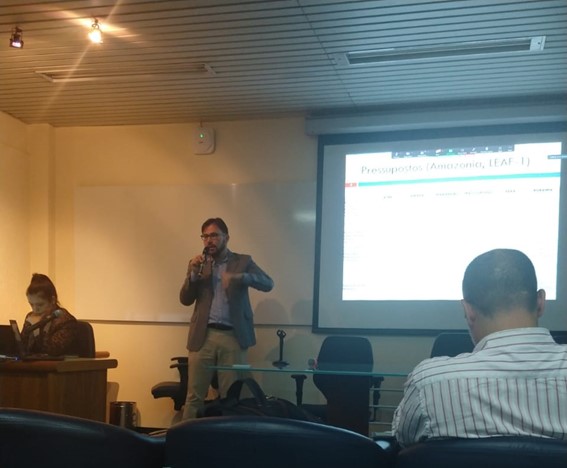Some 62 representatives of national and subnational governments, NGOs, academia and research institutes attended “Bringing together diverging REDD+ methodologies for strengthening Brazil’s REDD+ finance potential” on May 3, 2022. The event was held at the headquarters of the Brazilian Institute for Spatial Research (INPE) in São José dos Campos, Brazil.
The morning session focused on presenting Brazilian initiatives under REDD+ to estimate GHG emissions and results-based payments from avoided deforestation. Prof. Raoni Rajão from the Federal University of Minas Gerais (UFMG) showed the differences between estimates by the Amazon Fund, the Forest Reference Emissions Level (FREL) and state proposals submitted to the LEAF Coalition. He pointed out that a baseline of five years, such as in the LEAF Coalition, seems more robust and may better represent the effects of public policies on deforestation rates. Prof. Rajão also showed how state submissions vary greatly, generally around the use of carbon maps, deforestation data and reduction targets. These differences need to be addressed when scaling-up from sub-national to national level.
Subsequently, INPE’s team helped clarify the methods of GHG estimates from the land-use sector in the national inventory and the challenges for monitoring deforestation and degradation in Brazil. The latter might represent an important source of emission, but results-based payment initiatives do not yet account for it; its monitoring is still not effective, especially in the earlier stages. Environmental Ministry representatives offered an overview of FREL methodology and an update on the next submission period.
The afternoon session focused on the integrity of REDD+ methodologies, specifically the TREES standard developed by the ART Secretariat itself. The final panel allowed time for an open discussion, where participants, both online and on-site, shared their perspectives and asked questions.
This event was very relevant to our project since it allowed in-depth discussion of REDD+ methodology and its nuances. It was an important step for the WP4 team to simulate the potential of results-based payments.
















